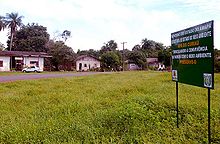
Information to change the world | |
Find Topics, Titles, Names related to your query |

Information to change the world | |
Find Topics, Titles, Names related to your query |
|
|
QuilomboFor the 1984 film, see Quilombo (film).
A quilombo (from the Kimbundu word kilombo) is a Brazilian hinterland settlement founded by people of African origin, Quilombolas, or Maroons. Most of the inhabitants of quilombos were escaped slaves and, in some cases, a minority of marginalised Portuguese, Brazilian aboriginals, Jews and Arabs, and/or other non-black, non-slave Brazilians who experienced oppression during colonization.
[edit] HistorySome quilombos were near Portuguese settlements and active both in defending against capites do mato commissioned to recapture slaves and in facilitating the escape of even more slaves. For this reason, they were targets of the Dutch, then Portuguese colonial authorities and, later, of the Brazilian state and slaveowners. Some quilombos that were farther from Portuguese settlements and the later Brazilian cities were tolerated and still exist as towns today, with their dwellers speaking distinctly African-Portuguese Creole languages[1]. In the Spanish-speaking countries of Latin America, such a settlement is called a palenque and its inhabitants are palenqueros who speak various Spanish-African-based creole languages. 
A Quilombo in Amap¡.
It is widely believed that the term quilombo establishes a link between Palmares and the culture of central Angola where the majority of slaves were forcibly brought to Brazil, because, during the time of the slave trafficking, natives in central Angola, called Imbangala, had created an institution called a kilombo that united various tribes of diverse lineage into a community designed for military resistance during that time of upheaval. However, the documentation on Palmares typically uses the term mocambo to describe the settlements, and quilombo was not used until the 1670s and then primarily in more southerly parts of Brazil. The most famous quilombo was Palmares, an independent, self-sustaining republic near Recife, established in about 1600. Part of the reason for the massive size of the quilombo at Palmares was because of its location in Brazil, which was at the median point between the Atlantic Ocean and Guinea, an important area of the African slave trade. At its height, Palmares was massive and consisted of several settlements with a combined population of over 30,000 renegades, mostly blacks. Ganga Zumba and Zumbi are the two most well known warrior-leaders of Palmares which, after a history of conflict with, first, Dutch and then Portuguese colonial authorities, finally fell to a Portuguese artillery assault in 1694. In Brazil, both men are now honored as heroes and symbols of black pride, freedom and democracy. Zumbi's execution date (as his birthday is unknown), November 20, is observed as Dia da Conscincia Negra or "Black Awareness Day" in the states of Rio de Janeiro and So Paulo, and his image has appeared on postage stamps, banknotes and coins. In the Spanish dialect of the River Plate, the word quilombo has come to mean brothel[2], and later big mess[2]. In Venezuelan Spanish, it means boondocks[2]. A 1984 film titled Quilombo[3] depicts the rise and fall of Palmares. Directed by Carlos Diegues, Quilombo is a mystical, yet mostly accurate, historical epic that chronicles the lives of Ganga Zumba and Zumbi. [edit] The quilombos protected by Brazilian ConstitutionThe 1988 Constitution of Brazil granted the remaining quilombos the collective ownership of the lands they have occupied since colonial times, thus recognizing their distinct identity at the same level of the Indians. 
Bust of Zumbi in Braslia. The plaque reads: "Zumbi dos Palmares, the black leader of all races."
[edit] See also
[edit] References
[edit] External links
Related topics in the Connexions Subject Index
Alternatives –
Left History –
Libraries & Archives –
Social Change –
This article is based on one or more articles in Wikipedia, with modifications and additional content contributed by
Connexions editors. This article, and any information from Wikipedia, is covered by a
Creative Commons Attribution-Sharealike 3.0 Unported License (CC-BY-SA) and the
GNU Free Documentation
License (GFDL). |
Connect with Connexions



|